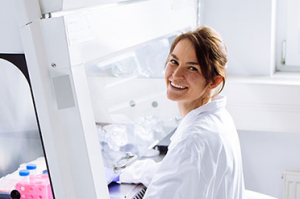In this webinar Dr. Stefan Ameres from the Institute of Molecular Biotechnology in Vienna, Austria (IMBA) and Dr. Johannes Zuber from the Institute of Molecular Pathology (IMP):
- Explain the basic principles and experimental implementation of SLAMseq metabolic RNA labeling method
- Outline the method’s utility for probing direct transcriptional targets of regulatory genes as well as primary transcriptional responses to drug treatment
- Discuss future applications
- Answer questions from the online audience during the live broadcast!
Abstract
While conventional RNA sequencing allows comprehensive transcriptome analyses at steady state, its utility for probing transcriptional responses to cell perturbations is limited by the vast diversity of messenger RNA (mRNA) and protein half-lives. At early time points, detectable changes in mRNA abundance are inevitably biased toward short-lived transcripts, while analyses at later time points do not allow for distinguishing direct from secondary effects. We have developed a simple, scalable method for enabling direct detection of 4-thiouridine (4sU)-labeled transcripts within the total RNA pool, which can be combined with standard RNA sequencing methods for investigating dynamic changes in gene expression. We have named this technique “thiol (SH)-Linked Alkylation for the Metabolic sequencing of RNA” (SLAMseq). One key application of SLAMseq is to directly quantify specific or global changes in mRNA output following pharmacological or chemical–genetic gene perturbation, and to thereby define primary transcriptional functions of genes and drugs.
Speakers’ biography:
Dr. Ameres earned his Master’s degree in biology at the Friedrich-Alexander University Erlangen-Nuremberg in Germany and his Ph.D. at the University of Vienna, Austria. In his award-winning Ph.D. thesis, he reported the first in-depth enzymatic characterization of the human RNA interference effector complex. After his postdoctoral studies at the University of Massachusetts Medical School in Worcester, he joined the Institute of Molecular Biotechnology of the Austrian Academy of Sciences as a group leader in 2012. For his innovative studies on fundamental biological mechanisms of gene regulation, Dr. Ameres received several awards, including the Houska Award from the B&C Private Foundation and the Research Award for Young Scientists from the Austrian Society for Genetics and Gene Technology, and obtained a starting and proof-of-concept grant from the European Research Council as well as a START grant from the Austrian Science Fund. He is member of the European Molecular Biology Organization Young Investigator Program and the Austrian Academy of Sciences (Young Academy).
Dr. Zuber is a group leader at the Research Institute of Molecular Pathology (IMP) in Vienna, Austria, and an adjunct professor at the Medical University of Vienna. Following his medical studies and clinical training in hematology and oncology at Charité – Berlin Medical University in Berlin, Germany, he joined Scott Lowe’s laboratory at Cold Spring Harbor Laboratory in the United States, where he was later appointed a Clinical Research Fellow. In 2011, he founded his own lab at IMP, where he develops and applies innovative functional genetic models and screening technologies to identify and mechanistically probe dependencies and candidate therapeutic targets in leukemia and other cancers. A particular focus is the study of bromodomain-containing protein 4 (BRD4) and other chromatin-associated dependencies in leukemia. Dr. Zuber received a European Research Council Starting Grant in 2015, was selected as a European Molecular Biology Organization Young Investigator, and was awarded the prestigious German Cancer Prize in 2016 by the German Cancer Society and German Cancer Foundation.
SLAMseq Metabolic RNA Labeling kits are available at Lexogen. Learn more at the product web page.








